Category Kelsey Chapman Show all
-
IDPwD 2025: Fostering disability-inclusive societies for advancing social progress (online panel)
Share IDPwD 2025: Fostering disability-inclusive societies for advancing social progress (online panel) on Facebook Share IDPwD 2025: Fostering disability-inclusive societies for advancing social progress (online panel) on Twitter Share IDPwD 2025: Fostering disability-inclusive societies for advancing social progress (online panel) on Linkedin Email IDPwD 2025: Fostering disability-inclusive societies for advancing social progress (online panel) link
Post-IDPwD 2025 Wrap-Up
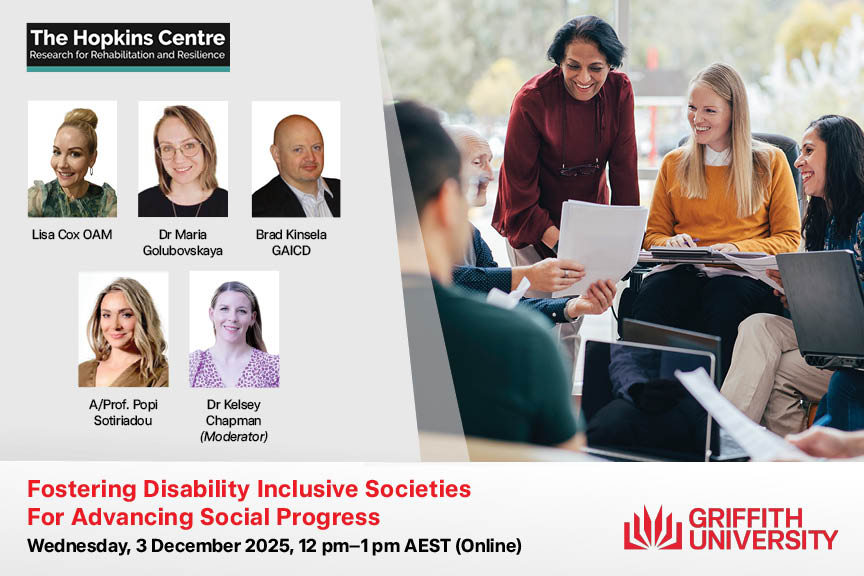
Thank you to everyone who joined us to mark International Day of People with Disability (IDPwD 2025). Our online forum—co-hosted by The Hopkins Centre, Inclusive Futures: Reimagining Disability, and the Griffith Business School—brought together an outstanding panel: Lisa Cox OAM, Dr Maria Golubovskaya, Brad Kinsela GAICD and A/Prof Popi Sotiriadou, moderated by Dr Kelsey Chapman.
Our speakers unpacked this year’s theme, Fostering disability-inclusive societies for advancing social progress, exploring opportunities for education, employment, business and community inclusion as we look ahead to Brisbane 2032.
If you missed the event, you can now watch the accessible recording and read the full transcript: https://youtu.be/1CtIb3MjHd0?si=dwtxovMtF3_I4Ffl
We also invite you to explore our HDR Scholars with Disability blog, showcasing lived-experience research shaping more inclusive futures at Griffith. https://inclusivefutures.griffith.edu.au/news/news_feed/idpwd-celebrating-our-griffith-university-hdr-disability-scholars
👉 View the video, transcript, and event recap: https://www.hopkinscentre.edu.au/news-view/international-day-of-persons-with-disabilities-538
More information:
Inclusive Futures: Reimagining Disability
inclusivefutures@griffith.edu.auFostering disability inclusive societies
for advancing social progressJoin us to mark the United Nations International Day of Persons with Disabilities on Wednesday, 3 December 2025 (12:00–1:00pm AEST) in our online forum hosted by Griffith Business School’s Equity, Diversity and Inclusion Committee, Inclusive Futures Reimagining Disability, and The Hopkins Centre.
This year’s theme Fostering disability inclusive societies for advancing social progress, offers an important opportunity to explore how we can create more inclusive communities as we head towards the Brisbane 2032 Olympic and Paralympic Games.
In Australia, one in five people experience disability and related barriers to meaningful employment. In this discussion, our panel will consider both the opportunities and challenges of fostering disability inclusion in Southeast Queensland—particularly in the areas of education, employment, volunteering, and business. We’ll also explore how mega-sporting events like Brisbane 2032 can be leveraged as tools for long-term social and economic progress, rather than producing only short-term, event-based opportunities.
You will hear from:
Lisa Cox OAM is an author, university researcher, TEDx speaker and internationally awarded thought leader. Her work is focused on epistemic disruption, leveraging the power and influence of industries like media and advertising to change social attitudes about disability while positively impacting social outcomes, like employment.
Dr. Maria Golubovskaya, Lecturer, Griffith Business School – researching youth and disability employment, hospitality work, and service worker wellbeing.
Brad Kinsela GAICD brings an extensive background as disability and social inclusion champion, qualified access consultant and board member/company director, Adjunct Industry Fellow at Griffith University, as well as an extensive career as a 'former' senior executive in the Government for over 26 years, including the Games Independent Infrastructure and Coordination Authority. Coming from a background of disability and human rights advocacy, lobbying, and community-based human services and practice, it is not surprising that Brad has maintained his connections, profile, and commitment to living in a society that values, services and embraces all members of communitySeparate from his public policy life, his love for family and friends and embracing the outdoor wonders of the world has seen Brad take his passion to have accessibility and inclusion as the 'norm' rather than the exception has taken him to many places, most notably Barcelona and Paris in 2025 during the Paralympic Games.
Associate Professor Popi Sotiriadou is a lecturer and researcher with the Griffith Business School and a distinguished international expert in managing high-performance sport and sports education. Her work focuses particularly on advancing women in sport, accessibility, and inclusive practices that ensure equitable participation and representation. Popi is the founder of Vision for Motion, an innovative app that promotes physical activity, wellbeing, and community connection for people with visual impairments.
The discussion will be moderated by Dr Kelsey Chapman, Research Fellow with Inclusive Futures: Reimagining Disability, whose work explores effective service delivery for people with disability, particularly in transport and health.
Accessibility will be a priority, with live captions available throughout the session. This event will also be recorded and shared post-event, along with a full transcript for those who could not attend via YouTube and our website.
More information
Inclusive Futures: Reimagining Disability
inclusivefutures@griffith.edu.auDr Millicent Kennelly – Griffith Business School
m.kennelly@griffith.edu.au -
Disability Action Week 2025: Communicate. Connect. Create.
Share Disability Action Week 2025: Communicate. Connect. Create. on Facebook Share Disability Action Week 2025: Communicate. Connect. Create. on Twitter Share Disability Action Week 2025: Communicate. Connect. Create. on Linkedin Email Disability Action Week 2025: Communicate. Connect. Create. link
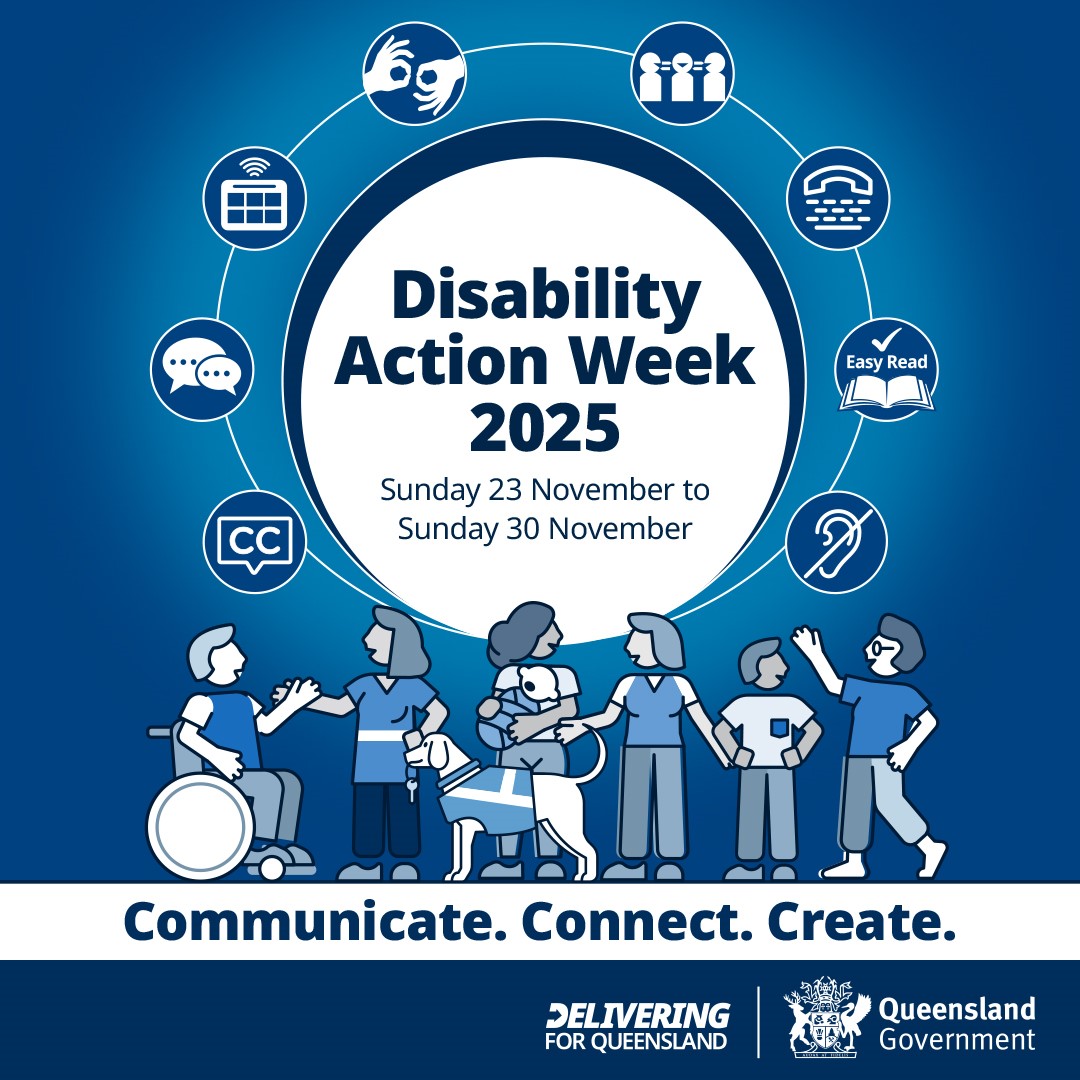
Disability Action Week is a statewide celebration of accessibility, inclusion and the simple actions we can all take to make Queensland a place where everyone can participate fully. This year’s theme — Communicate. Connect. Create.— encourages all of us to put accessible communication into practice and recognise its role in building stronger, more inclusive communities.
Small changes matter. By making information easier to understand, offering alternative formats, improving event accessibility, or taking the time to ask someone about their communication preferences, we help create environments where everyone feels welcome, respected and supported.
Shining a Spotlight on Hopkins Research
The Hopkins Centre is a leading translational research centre in disability and rehabilitation, based at Griffith University and Princess Alexandra Hospital. Our work focuses on finding practical solutions to complex challenges through interdisciplinary, collaborative and responsive research that is embedded directly in practice.
While disability and rehabilitation research rarely makes headlines in the same way that medical breakthroughs do, it is essential work. Because we work alongside people with disability, their families, clinicians, policymakers and service organisations, we see firsthand where innovation is needed — and we act on it.
We are committed to valuing the voice of people with disability in every stage of decision-making and discovery. Their insights shape our research, guide our priorities and ensure we develop solutions that genuinely improve quality of life.
We regularly produce accessible and alternative-format resources, co-design tools with end users, and embed accessibility in all engagement — from Easy Read and plain language materials to inclusive events, captioning, Auslan, and culturally appropriate communication approaches.
This year, we are highlighting three impactful projects: co-designing communication tools for people with spinal cord injury, developing accessible sleep resources for people with SCI, and strengthening mental health support pathways for PhD students through inclusive, evidence-based approaches.
We need your support to continue designing high-quality solutions, services and systems that make a real difference.
To get involved or explore current research opportunities, visit hopkinscentre.edu.au/participate-research or email hopkinscentre@griffith.edu.au.SPOTLIGHT PROJECTS FOR DISABILITY ACTION WEEK
1. Co-designing Communication Tools in the Spinal Injuries Unit
Clear and respectful communication is essential in healthcare, especially for people with complex communication needs. We are partnering with people with spinal cord injury, families, clinicians and lived-experience researchers to co-design a new communication resource for the Metro South Health Spinal Injuries Unit.
Join our online co-design workshops (Microsoft Teams):
- Patients & Families: Thursday 4 December, 12pm
- Staff: Monday 8 December, 10am
Register your interest: https://inclusivefutures.griffith.edu.au/siu-info
Contact: Dr Kelsey Chapman (Research Fellow) – dignityproject@griffith.edu.au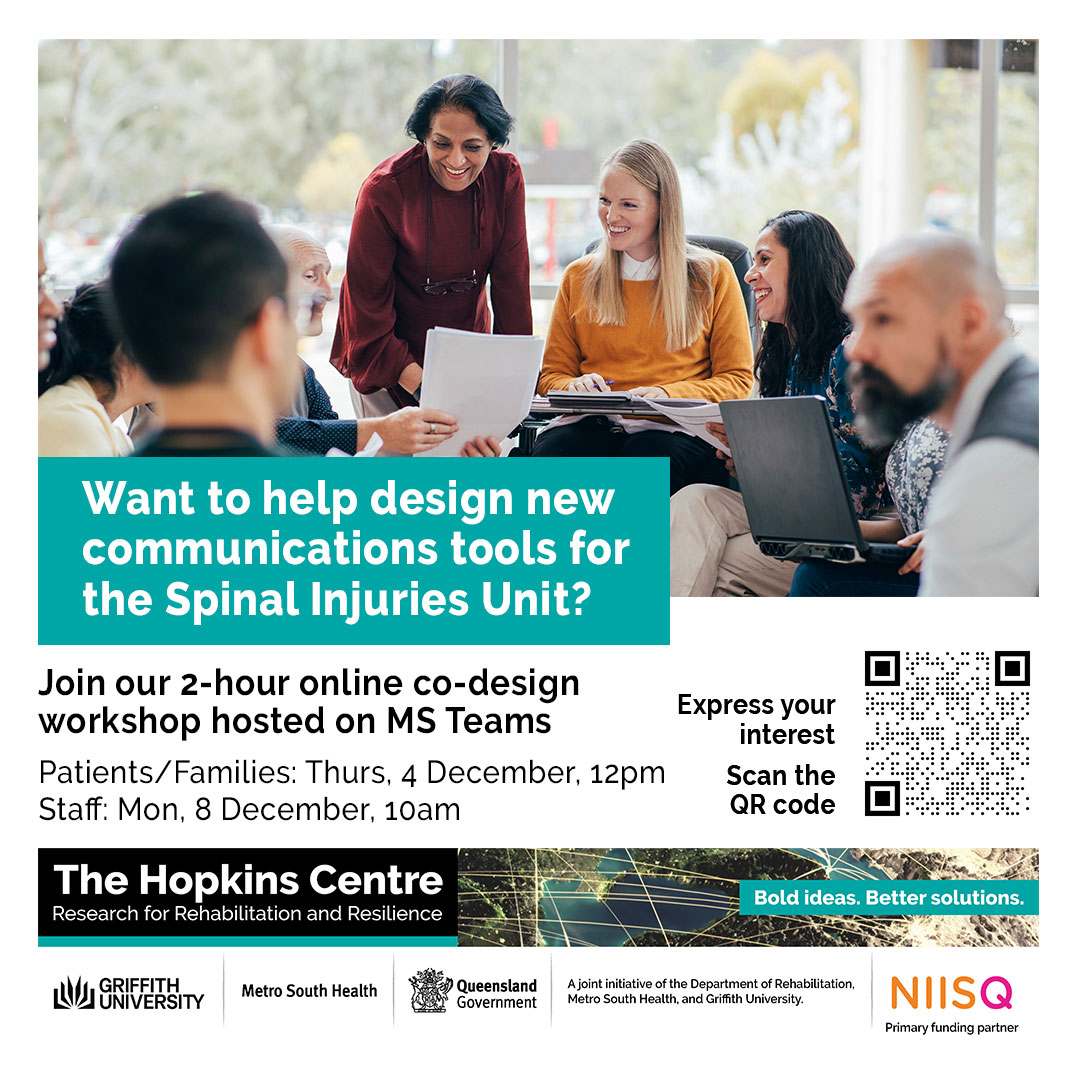
2. Sleep and Spinal Cord Injury
Poor sleep affects two in three people with spinal cord injury, yet many do not receive the support they need. Dr Emily Bray and her team at The Hopkins Centre, together with Spinal Life Australia, the Institute for Breathing and Sleep and QSCIS, have co-designed new evidence-based resources to help people understand sleep changes and explore strategies that support better rest and wellbeing.
Communicate: This project aims to raise awareness of sleep issues following SCI and to share the best ways to manage them from the perspectives of people with SCI and healthcare professionals.
Connect: Researchers, clinicians, and people with SCI collaborated through a series of co-design workshops to identify how to address SCI-specific sleep issues and their preferred approaches to managing them.
Create: The main result of this project has been the creation of co-designed sleep management resources tailored to the needs and preferences of people with SCI.
Key findings and solutions include:
Sleep issues following SCI emerge early after the injury and persist throughout life. It is crucial to raise awareness among people with SCI and clinicians about the harmful effects of poor sleep quality, the causes of sleep disturbances, and possible solutions. Participants suggested various solutions, including early and routine assessments, as well as educational resources that researchers and clinicians could explore to address these issues.
Learn more and access the resources:
https://www.hopkinscentre.edu.au/project/seed-project-sleep-disturbances-following-spinal-163Contact Dr Emily Bray:
https://www.hopkinscentre.edu.au/people-view/emily-bray-177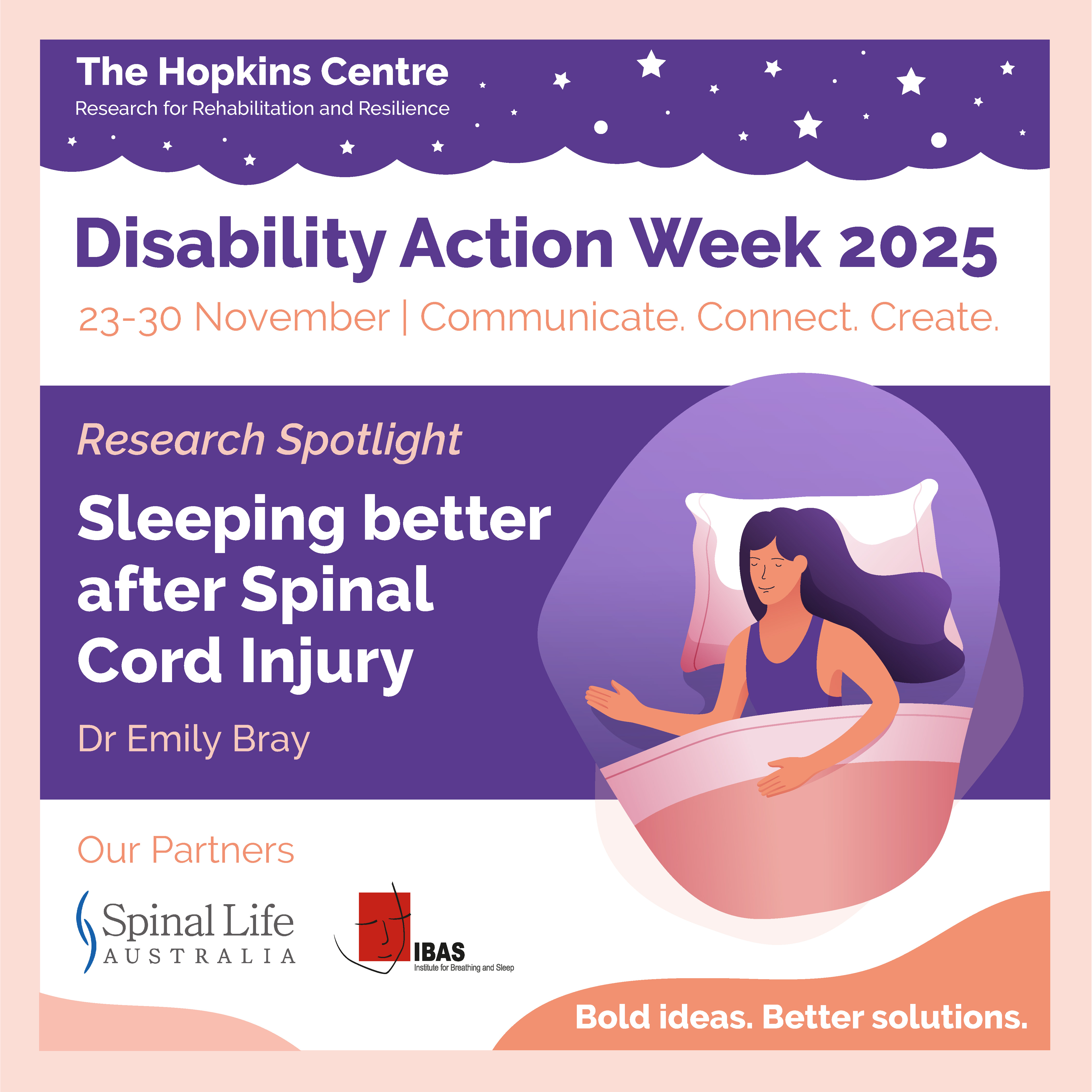
3. Creating Supportive Pathways for PhD Student Mental Health
Behind the prestige of a PhD lies a hidden mental health crisis. Many candidates face severe distress, driven by isolation, financial pressure, and perfectionism, with research suggesting up to one-third meet suicide-risk criteria. PhD researcher Ali Khan at The Hopkins Centre focuses on better mental health support and adjustments for PhD students, particularly those with psychosocial disabilities.
Communicate: The project aims to break the silence around PhD mental health, fostering open communication between students, supervisors, and institutions to remove bureaucratic barriers to support.
Connect: By bringing together all the key stakeholders, the research builds connections to combat isolation and create a collaborative, supportive academic community.
Create: The goal is to create practical, systemic solutions and more inclusive policies that support the mental well-being and academic success of all PhD students.
Key findings and solutions include:
- Key Risks: Loneliness, impostor syndrome, financial instability, and supervisor-student misalignment are major predictors of distress.
- Effective Strategies: Digital mental health tools, peer financial mentoring, and therapeutic approaches like music therapy show significant promise as accessible, low-cost interventions.
Learn more and access resources:
The Research Project: Improving Mental Health Accommodations for PhDs
Contact Ali Khan: ali.khan3@griffithuni.edu.au
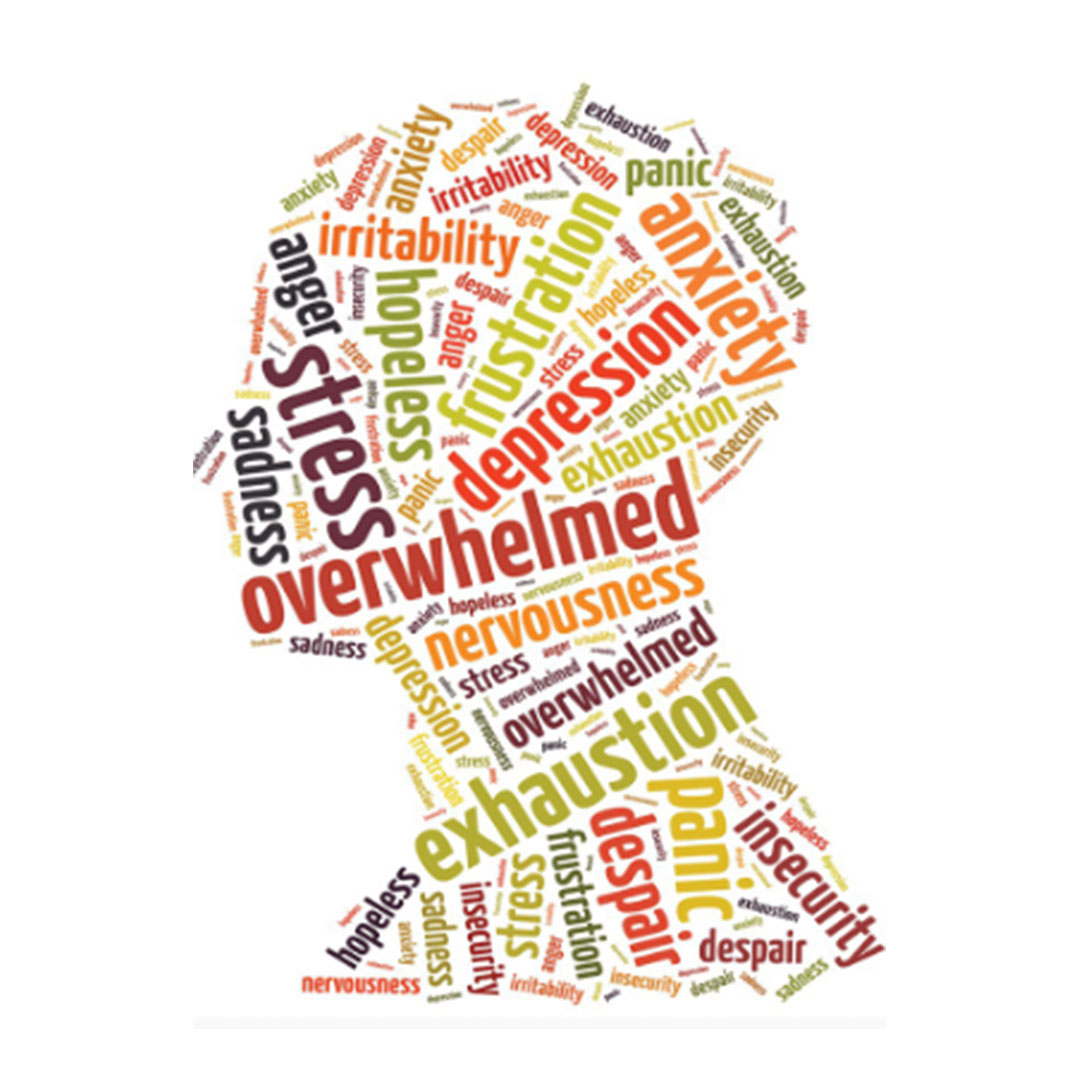
-
IDPwD Panel Discussion: Fostering disability inclusive societies for advancing social progress
Share IDPwD Panel Discussion: Fostering disability inclusive societies for advancing social progress on Facebook Share IDPwD Panel Discussion: Fostering disability inclusive societies for advancing social progress on Twitter Share IDPwD Panel Discussion: Fostering disability inclusive societies for advancing social progress on Linkedin Email IDPwD Panel Discussion: Fostering disability inclusive societies for advancing social progress link
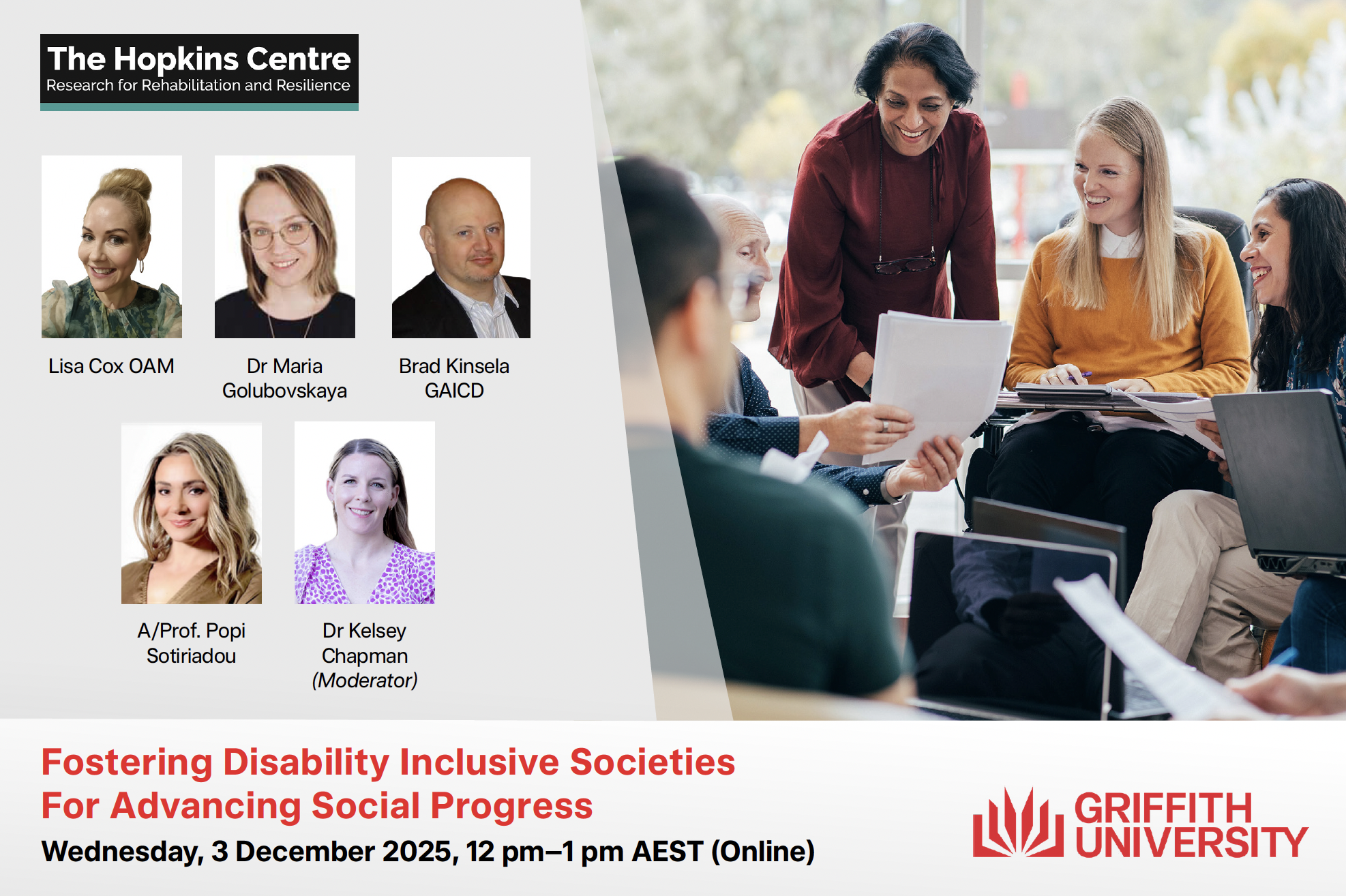
Join us to mark the United Nations International Day of Persons with Disabilities on Wednesday, 3 December 2025 (12:00–1:00pm AEST) in our online forum hosted by Griffith Business School’s Equity, Diversity and Inclusion Committee, Inclusive Futures Reimagining Disability, and The Hopkins Centre.
This year’s theme Fostering disability inclusive societies for advancing social progress, offers an important opportunity to explore how we can create more inclusive communities as we head towards the Brisbane 2032 Olympic and Paralympic Games.
In Australia, one in five people experience disability and related barriers to meaningful employment. In this discussion, our panel will consider both the opportunities and challenges of fostering disability inclusion in Southeast Queensland—particularly in the areas of education, employment, volunteering, and business. We’ll also explore how mega-sporting events like Brisbane 2032 can be leveraged as tools for long-term social and economic progress, rather than producing only short-term, event-based opportunities.
You will hear from:
Lisa Cox OAM is an author, university researcher, TEDx speaker and internationally awarded thought leader. Her work is focused on epistemic disruption, leveraging the power and influence of industries like media and advertising to change social attitudes about disability while positively impacting social outcomes, like employment.
Dr. Maria Golubovskaya, Lecturer, Griffith Business School – researching youth and disability employment, hospitality work, and service worker wellbeing.
Brad Kinsela GAICD brings an extensive background as disability and social inclusion champion, qualified access consultant and board member/company director, Adjunct Industry Fellow at Griffith University, as well as an extensive career as a 'former' senior executive in the Government for over 26 years, including the Games Independent Infrastructure and Coordination Authority. Coming from a background of disability and human rights advocacy, lobbying, and community-based human services and practice, it is not surprising that Brad has maintained his connections, profile, and commitment to living in a society that values, services and embraces all members of communitySeparate from his public policy life, his love for family and friends and embracing the outdoor wonders of the world has seen Brad take his passion to have accessibility and inclusion as the 'norm' rather than the exception has taken him to many places, most notably Barcelona and Paris in 2025 during the Paralympic Games.
Associate Professor Popi Sotiriadou is a lecturer and researcher with the Griffith Business School and a distinguished international expert in managing high-performance sport and sports education. Her work focuses particularly on advancing women in sport, accessibility, and inclusive practices that ensure equitable participation and representation. Popi is the founder of Vision for Motion, an innovative app that promotes physical activity, wellbeing, and community connection for people with visual impairments.
The discussion will be moderated by Dr Kelsey Chapman, Research Fellow with Inclusive Futures: Reimagining Disability, whose work explores effective service delivery for people with disability, particularly in transport and health.
Accessibility will be a priority, with live captions available throughout the session. This event will also be recorded and shared post-event, along with a full transcript for those who could not attend via YouTube and our website.
👉 Register now to be part of this important conversation: https://shorturl.at/Nx5Qk
More information
Inclusive Futures: Reimagining Disability
inclusivefutures@griffith.edu.auDr Millicent Kennelly – Griffith Business School
m.kennelly@griffith.edu.au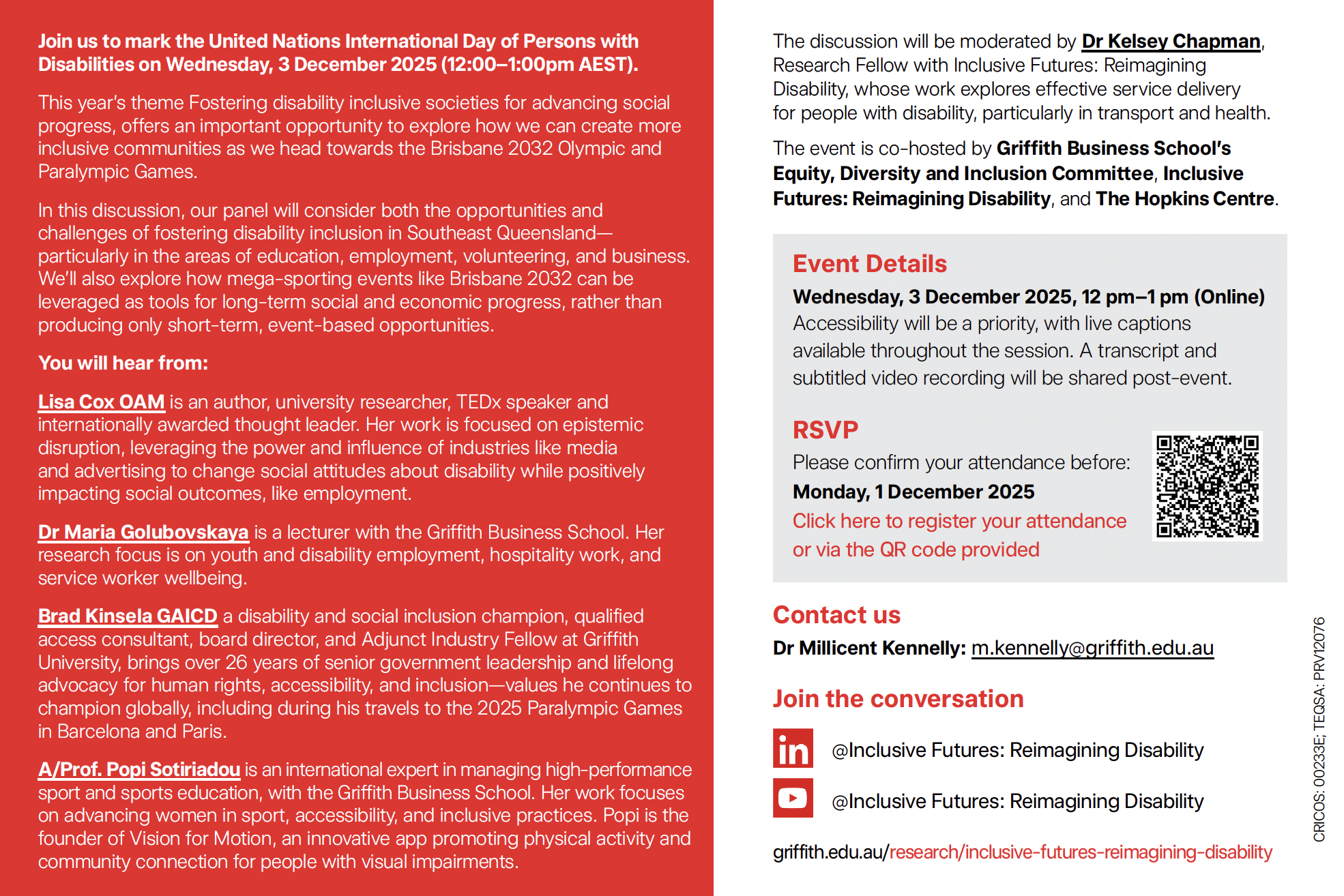
-
Inclusive Futures: Reimagining Disability joins the World Health Organisation Disability Health Equity Network
Share Inclusive Futures: Reimagining Disability joins the World Health Organisation Disability Health Equity Network on Facebook Share Inclusive Futures: Reimagining Disability joins the World Health Organisation Disability Health Equity Network on Twitter Share Inclusive Futures: Reimagining Disability joins the World Health Organisation Disability Health Equity Network on Linkedin Email Inclusive Futures: Reimagining Disability joins the World Health Organisation Disability Health Equity Network link

We’re proud to announce that Inclusive Futures: Reimagining Disability, Griffith University, led by Professor Elizabeth Kendall OAM GAICD (Director) has officially become a member of the World Health Organisation (WHO) Disability Health Equity Network — a landmark global initiative driving action to achieve health equity for the 1.3 billion people worldwide with disability.
Representing Inclusive Futures at the Network’s Inauguration this week (12–13 November) at WHO Headquarters, Geneva, are Dr Kelsey Chapman (Research Fellow, The Dignity Project) and Dr Kelly Clanchy (Program Director, Bachelor of Clinical Exercise Physiology).
This global collaboration recognises that people with disability continue to face significant and avoidable health inequities—including shorter life expectancy and higher risk of disease—due to systemic barriers in and beyond health systems.
Investing in disability-inclusive health is not only a human rights obligation—it’s smart policy, with research showing a tenfold return on investment in inclusive health care.
We’re honoured to contribute to this international movement working to ensure Health for All truly means all.
 Dr Kelly Clanchy together with Dr Kelsey Chapman at the WHO Conference in Geneva.
Dr Kelly Clanchy together with Dr Kelsey Chapman at the WHO Conference in Geneva. Dr Kelsey Chapman
Dr Kelsey Chapman -
Voice of Queenslanders with Disability 2025
Share Voice of Queenslanders with Disability 2025 on Facebook Share Voice of Queenslanders with Disability 2025 on Twitter Share Voice of Queenslanders with Disability 2025 on Linkedin Email Voice of Queenslanders with Disability 2025 link
 Help Amplify the Voices of Queenslanders with Disability
Help Amplify the Voices of Queenslanders with DisabilityWe are excited to announce that the Voice of Queenslanders with Disability Survey 2025 is now live! This vital research, led by The Dignity Project at Griffith University, provides an opportunity for Queenslanders with disability, their families, carers, and organisations to share their experiences, helping to shape a more inclusive and accessible future.
We are proud to collaborate with Queenslanders with Disability Network (QDN) and the Queensland Government’s Department of Families, Seniors, Disability Services, and Child Safety to ensure that lived experiences are heard and inform future policies and programs.
We would greatly appreciate your support in promoting this survey through your networks. You can help by:
- Taking the survey: https://inclusivefutures.griffith.edu.au/hub-page/vqd
- Sharing the survey via email, newsletters, or your social media channels
- Sharing our social media: https://shorturl.at/0oFD6
- Forwarding this information to any citizen researchers, colleagues, or community members who may be interested
- Encouraging participation in alternate formats or through phone/virtual interviews
Survey closes: Wednesday, 30 April 2025
Accessible and alternate formats are available to ensure everyone has the opportunity to participate.
We appreciate your help in spreading the word so we can reach as many voices as possible. Together, we can work towards a more inclusive Queensland.
For more information, please contact us at inclusivefutures@griffith.edu.au.
Thank you for your support!
Dr Kelsey Chapman
Research Fellow
The Dignity Project
Inclusive Futures: Reimagining Disability -
Empowering Health Communication: Co-Designing with People with Disability
Share Empowering Health Communication: Co-Designing with People with Disability on Facebook Share Empowering Health Communication: Co-Designing with People with Disability on Twitter Share Empowering Health Communication: Co-Designing with People with Disability on Linkedin Email Empowering Health Communication: Co-Designing with People with Disability link

📚 Authors: Dr Kelsey Chapman, Dr Connie Allen, Prof. Elizabeth Kendall AM GAICD
📅 Published: 9 February 2025
📖 Journal: Journal of Health Communication
🔗 DOI: https://doi.org/10.1080/10810730.2025.2462679How can we make health communication truly inclusive? A recent scoping review by Inclusive Futures: Reimagining Disability researchers explores the power of co-designing health initiatives with people with disability—not just for them.
Key Insights:
Inclusive Participation: Engaging people with disabilities from the outset ensures their voices shape accessible, effective health communications.
Diverse Methods: From workshops and focus groups to participatory action research, different co-design approaches foster genuine collaboration.
Enhanced Outcomes: Inclusive approaches improve the quality of health information, empower participants, and build trust in health initiatives.
This research reinforces that co-design isn’t just best practice—it’s essential. When health communication is built with the community, it becomes more impactful, equitable, and transformative.
More Information:
Dr Kelsey Chapman
Inclusive Futures: Reimagining Disability
Griffith University
k.chapman@griffith.edu.auProf. Elizabeth Kendall AM GAICD
e.kendall@griffith.edu.au
-
Disability Reform Summit: Moving from recommendations to evidence-based solutions
Share Disability Reform Summit: Moving from recommendations to evidence-based solutions on Facebook Share Disability Reform Summit: Moving from recommendations to evidence-based solutions on Twitter Share Disability Reform Summit: Moving from recommendations to evidence-based solutions on Linkedin Email Disability Reform Summit: Moving from recommendations to evidence-based solutions link

The Disability Reform Summit was hosted by the Dignity Project and funded by an Engaging Science Grant from the Department of Environment and Science.
The Summit brought together a diverse group of citizen scientists, Queensland disability researchers and academics, and key disability persons and advocacy organisations for a collaborative agenda-setting workshop.
The workshop sought to co-create priorities for research based on the NDIS Review recommendations, Disability Royal Commission recommendations, and the Voice of Queenslanders with Disability report recommendations, while moving towards evidence-based solutions that will directly contribute to government and service responses.
Twenty-one attendees worked collaboratively over a 4-hour workshop and identified key priorities, much of which was focused on improving disability data collection, better implementation of consistent disability flags across mainstream services, and increasing sustainable long-term partnerships and funding.
Workshop attendees wanted to prioritise projects that focus on building evidence for knowledge and evidence gaps, although 50% of participants also wanted to examine existing interventions to evaluate and improve them.
 L-R: Dr Kelsey Chapman; Dr Talitha Kingsmill and Sharon White; and Nerine Williams.
L-R: Dr Kelsey Chapman; Dr Talitha Kingsmill and Sharon White; and Nerine Williams.TOPICS AND INSIGHTS
Health and Wellbeing:
- Promoting health consumerism principles and access for all.
- Shifting from reactive to pre-emptive health strategies.
- Addressing disparities in health equity and access.
- Campaigns like 'Hear Me, See Me, Understand Me' and involving lived experiences in decisions.
- Potential research includes integrating health awareness into education and enhancing professional understanding of diverse needs.
Employment and Financial Security:
- Psychological safety and accommodations in the workplace.
- Inclusive recruitment, onboarding, and raising employment expectations.
- Examining current inclusive policies and staff training in unconscious bias.
- Potential research includes building inclusive research teams and understanding confidence in disability-related conversations.
 Top: Panelists Prof. Elizabeth Kendall AM, Dr Talitha Kingsmill, Sharon White and Prof. David Trembath. Bottom: Dr Kelsey Chapman leads the summit workshop activities. Inclusive Education and Learning:
Top: Panelists Prof. Elizabeth Kendall AM, Dr Talitha Kingsmill, Sharon White and Prof. David Trembath. Bottom: Dr Kelsey Chapman leads the summit workshop activities. Inclusive Education and Learning:- Need for inclusive school rules and evolving educational practices.
- Redesigning assessment methods and promoting reasonable adjustments.
- Potential research focuses on leadership attitudes and diverse perspectives in education, reassessing student success metrics.
Inclusive and Accessible Communities:
- Evaluating compliance vs. actual accessibility and inclusion.
- Measuring community inclusion and the impact of co-design.
- Opportunities like Brisbane 2032 for updating infrastructure and promoting universal accessibility.
Disability Data:
- Enhancing researcher capability and implementing consistent disability data flags.
- Prioritising projects to build evidence and evaluate existing interventions.
- Balancing academic interest with immediate social needs through co-design and sustainable partnerships.
 Top L-R: Sharon White and Prof. David Trembath; Julia Robertson.
Top L-R: Sharon White and Prof. David Trembath; Julia Robertson.
Bottom L-R: Dr Eloise Hummell and Nerine Williams; Geoff Trappett; Dr Maretta Mann. We extend our gratitude to the Queensland Government Department of Environment and Science for their support of this research. Our deepest thanks also go to Dr. Kelsey Chapman, Lead Researcher, and the Griffith University's Inclusive Futures: Reimagining Disability team, including Rebekah Barker, Joe-Anne Kek-Pamenter, Dr. Maretta Mann, and Professor Elizabeth Kendall AM, for their invaluable assistance in organising this event. Additionally, we appreciate the continuous dedication and support of our Summit participants and the wider Dignity Project team.Special thanks to Eric Tram, our videographer, illustrators Holly Bryant & Cate Withers and the team at Griffith University Live Worm (Libbi Reed, Jacqui Hancox and Sharon Searle) for their engaging Sketch Notes that beautifully captured the topics and insights of the Summit.
 Top L-R: Prof David Trembath; Dr Kelsey Chapman; Dr Eloise Hummell.
Top L-R: Prof David Trembath; Dr Kelsey Chapman; Dr Eloise Hummell.
Bottom L-R: Summit Participants; Prof. Elizabeth Kendall AM. Top L-R: Dr Talitha Kingsmill and Karin Swift.
Top L-R: Dr Talitha Kingsmill and Karin Swift.
Bottom: Dr Maretta Mann and Dr Kelsey Chapman lead discussion amongst their group.Acknowledgement
The Disability Reform Summit was funded by an Engaging Science Grant from the Queensland Department of Environment and Science and the Office of the Chief Scientist.
Watch the Disability Reform Summit highlights on YouTube: https://youtu.be/Wz2UJ08xOP0?si=xIu1T75BSAVJTm58 (Videographer: Eric Tram).
Join us in moving from recommendations to real change!
More information: Dr Kelsey Chapman, Research Fellow and Citizen Science Manager k.chapman@griffith.edu.au
SKETCH NOTES
For an accessible / alternate format of our sketch notes, please email inclusivefutures@griffith.edu.au







-
Voice of Queenslanders with Disability Survey - Queenslanders with Disability Network
Share Voice of Queenslanders with Disability Survey - Queenslanders with Disability Network on Facebook Share Voice of Queenslanders with Disability Survey - Queenslanders with Disability Network on Twitter Share Voice of Queenslanders with Disability Survey - Queenslanders with Disability Network on Linkedin Email Voice of Queenslanders with Disability Survey - Queenslanders with Disability Network link
Author: Monique Mita
Queenslanders with disability are encouraged to have their say on what it’s like to live in the sunshine state with the release of the 2024 Voice of Queenslanders with Disability survey.
“The 2023 survey had great impact on policy and planning in Queensland,” said Chief Investigator and Research Fellow with Inclusive Futures and the Hopkins Centre, Kelsey Chapman.
“The 2024 Voice of Queenslanders survey will give us keen insight into how the lives of Queenslanders with disability, their families and the people who support them have changed since last year.”
Griffith University Inclusive Futures: Reimagining Disability have been working with Queenslanders with Disability Network (QDN) to collect the information and deliver the annual survey results.
“We’re looking forward to generating and collecting more stories and partnering with the Queensland Government and QDN to build a more inclusive state for people with disability,” she said.
"The 2023 was a landmark in Australian disability policy and reform, and we are looking forward to understanding how this impacted the lives of Queenslanders with disability, their family and the people who support them.
“We will be paying special attention to comparing this year’s data with last year to identify key trends."
Visit the Voice of Queenslanders with Disability Survey on the link below:
https://qdn.org.au/voice-of-queenslanders-with-disability-survey/You can take the survey that is right for you!
https://inclusivefutures.griffith.edu.au/hub-page/vqd -
The Conversation: Travellers with disability often face discrimination. What should change and how to complain?
Share The Conversation: Travellers with disability often face discrimination. What should change and how to complain? on Facebook Share The Conversation: Travellers with disability often face discrimination. What should change and how to complain? on Twitter Share The Conversation: Travellers with disability often face discrimination. What should change and how to complain? on Linkedin Email The Conversation: Travellers with disability often face discrimination. What should change and how to complain? link
New Publication Alert:
The Conversation: Travellers with disability often face discrimination. What should change and how to complain?Authors: Kelsey Chapman, Professor Elizabeth Kendall and Lisa Stafford
Published: 24 January 2024
Former Disability Discrimination Commissioner Graeme Innes AM settled a dispute with Adelaide Airport over denied access to a body scanner with his assistance dog. His experience reflects challenges faced by Australia's 4.4 million people with disability in air travel.The Australian Human Rights Commission received over 100 disability discrimination complaints against airlines from 2016-2022, revealing systemic ableism. Freedom of movement, a UN right, is denied through discriminatory practices, damaged mobility equipment, and offensive situations. Urgent reform is needed, with recommendations for specific air travel standards and independent oversight.
Collaboration between governments and the aviation industry can ensure inclusive air travel, aligning with equity principles and promoting diversity. Complaints and legal support are available avenues, but proactive measures like the Disability Rights Act are crucial for lasting change. Everyone deserves dignified and autonomous travel experiences.Read ‘The Conversation’ article in full on the link below:
Visit our Inclusive Futures Hub:
https://inclusivefutures.griffith.edu.au
Contact:
Kelsey Chapman
-
Change 2023 Conference: Nothing About Us Without Us
Share Change 2023 Conference: Nothing About Us Without Us on Facebook Share Change 2023 Conference: Nothing About Us Without Us on Twitter Share Change 2023 Conference: Nothing About Us Without Us on Linkedin Email Change 2023 Conference: Nothing About Us Without Us link

CHANGE 2023 CONFERENCE
Empower, Enable, Enact
The Inclusive Futures: Reimagining Disability (IFRD) team had the pleasure to lead a session at Change 2023 last Friday, 20 October at Griffith University, Southbank Campus.
Change 2023 is an annual 2-day conference in Brisbane, Queensland hosted by Social Marketing @ Griffith, especially for practitioners, professionals, researchers and experts with an interest in making change happen.
In our session - Nothing About Us Without Us – Kelsey Chapman (IFRD Engagement Manager and PhD Candidate) lead a Q&A panel discussion with Professor Elizabeth Kendall (Director), Kevin Cocks, Brad Kinsela and Jim Hogan.
In this impactful discussion, they candidly shared their experiences as disability advocates and outlined challenges they have experienced in their decades of fighting for inclusion.
To find out more about Inclusive Futures and the research we do, visit our website:
https://www.griffith.edu.au/research/inclusive-futures-reimagining-disability